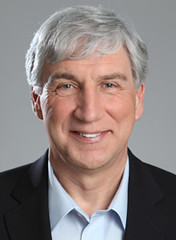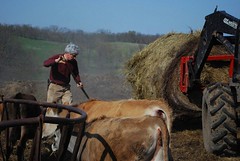Who is the Iowa Secretary of Agriculture? The answer to that question is, and has always been: whichever faithful servant of Big Agriculture was keeping the chair warm and keeping Monsanto, Koch and Cargill happy, Democrat or Republican. (Currently, it's a guy who loves chicken factories.) An urban dweller, I didn't think that the Ag Secretary had anything to do with me.
A few months ago, I met Francis Thicke, an organic dairy farmer who is running for Secretary of Agriculture, and he changed my mind about that.  I have begun to grasp how this official affects the food I eat, the quality of the air and rivers where I live, and waters far downstream from Iowa. I have even begun to hope for change in the way we produce food and use energy in Iowa, where we often set the example for farming practices across the country.
I have begun to grasp how this official affects the food I eat, the quality of the air and rivers where I live, and waters far downstream from Iowa. I have even begun to hope for change in the way we produce food and use energy in Iowa, where we often set the example for farming practices across the country.
Francis Thicke (pronounced “tickee”) has an organic dairy farm near Fairfield, Iowa, a small community best known as the home of Maharishi University. Francis and his wife, Susan, make milk, yogurt and cheese with the milk from his 80 cows, and sell all of it locally. Although he grew up on a farm, Francis wanted to be a musician. He studied music and philosophy in college, and plays a mean trumpet. But eventually he got a doctorate in agronomy instead, worked at the USDA, then came back to Iowa to start a dairy farm.
 Radiance Dairy is no ordinary farm. Livestock and landscape nourish each other. Everything the cows eat is grown on land they fertilize, and as Francis says, they enjoy their work. He uses solar panels to power pumps for water , to electrify fences, and to heat water for his dairy processing plant. A wind turbine is in the works. His operation is so innovative that he attracts visitors who come to learn, from local schoolchildren to the World Bank, and he travels frequently to teach and give lectures. He has received awards from the Leopold Center for Sustainable Agriculture, and the Iowa Chapter of the Sierra Club, which recognized him as a “Steward of the Land,” among other awards. People who know him regard him as a national treasure.
Radiance Dairy is no ordinary farm. Livestock and landscape nourish each other. Everything the cows eat is grown on land they fertilize, and as Francis says, they enjoy their work. He uses solar panels to power pumps for water , to electrify fences, and to heat water for his dairy processing plant. A wind turbine is in the works. His operation is so innovative that he attracts visitors who come to learn, from local schoolchildren to the World Bank, and he travels frequently to teach and give lectures. He has received awards from the Leopold Center for Sustainable Agriculture, and the Iowa Chapter of the Sierra Club, which recognized him as a “Steward of the Land,” among other awards. People who know him regard him as a national treasure.
more below the fold…
Continue Reading...